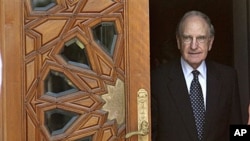The Obama administration will send Middle East peace envoy George Mitchell back to the region next week, despite an impasse over Israeli settlement building. The State Department said Wednesday that the U.S. goal of a framework peace accord between Israel and the Palestinians within a year is still within reach.
Officials here are acknowledging a tactical setback over the settlements issue, but insist that it will not deter the administration from its pursuit of a basic deal for a two-state settlement of the Middle East conflict by late next year.
The State Department conceded late Tuesday that efforts to persuade Israel to renew a moratorium on most West Bank settlement activity, as a means to restart direct peace talks between the parties, had failed.
The Obama administration had offered Israel a package of military aid and diplomatic incentives to renew the settlement freeze that expired in September. Israeli Prime Minister Benjamin Netanyahu himself, however, reportedly amenable to the idea, was unable to persuade hard-line members of his cabinet to go along.
The deal, which included a U.S. offer of 20 F-35 stealth fighter planes in exchange for a three-month freeze, is now off the table. The United States will try to narrow differences between the sides over core issues, including the borders of a Palestinian state.
In announcing the Mitchell mission next week, State Department Spokesman P.J. Crowley said the freeze issue had come to overshadow the broader agenda and that it is time to shift tactics.
"We have always supported direct negotiations as the only means to reach an agreement, and through an agreement end the conflict. That remains our view," he said. "There was considerable thought given to a [settlement] moratorium as being a mechanism by which we could make the kind of progress we are looking for. And at this point, after an intensive effort, we have concluded that that particular course is not going to bear fruit at this time. And we're going to move in a different direction."
The Palestinians had refused to extend direct peace talks with Israel, which occurred briefly in September, in the absence of another settlement freeze.
Crowley said the United States does not "accept the legitimacy" of continued Israeli settlements and will continue to express that position.
Mitchell's trip to the Middle East will be preceded by separate U.S. meetings with Israeli and Palestinian negotiators. News reports say that Israeli Defense Minister Ehud Barak and Palestinian negotiator Saeb Erekat will visit Washington during the next few days.
Mitchell, a former Senate leader and Northern Ireland peace envoy, is expected to visit key Arab allies, in addition to his contacts with the two parties, to brief them on the latest turn in U.S. diplomacy.




